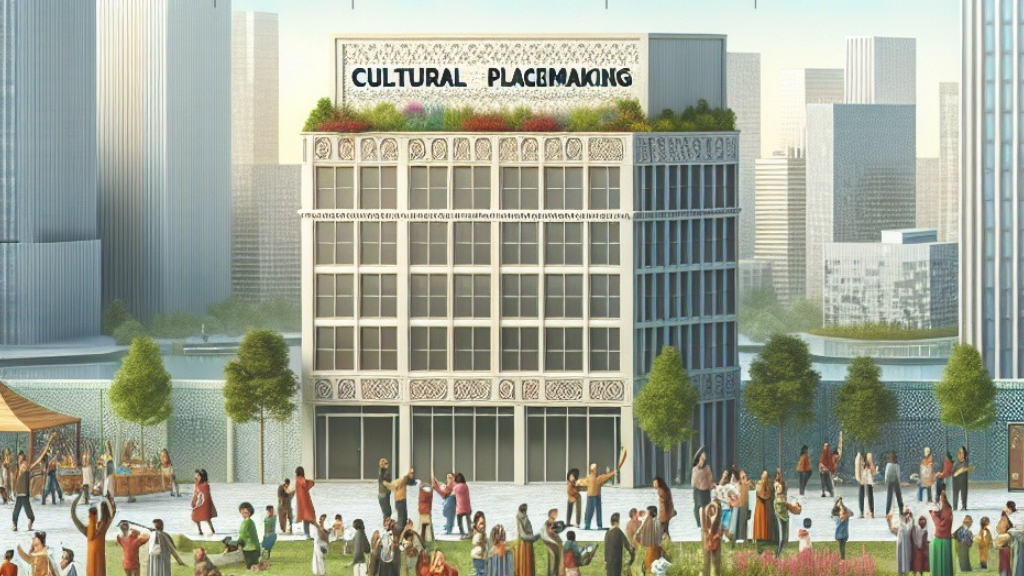
Cultural Placemaking: A New Paradigm for Corporate Social Responsibility
October 2, 2024
Blog Two: October 2024 of Cultural Placemaking Series
As a seasoned board member, Executive Director, and Consultant, I have witnessed the transformative power of cultural placemaking. Moreover, growing up in social housing on some of the UK’s most deprived estates, I’ve experienced its impact firsthand. This innovative approach is reshaping corporate social responsibility (CSR), creating lasting, meaningful change in communities across the nation.
The Power of Cultural Placemaking
Picture an industrial wasteland transformed into a vibrant community hub. The air is filled with conversation, laughter, and music. Colourful murals adorn walls, narrating the community’s rich history and diverse culture. This is the essence of cultural placemaking – a process that integrates arts, culture, and community engagement into the very fabric of a place, fostering local identity, social cohesion, and economic vitality.
Why Should Businesses Care?
- Enhanced Reputation: Demonstrating genuine commitment to community well-being and social responsibility.
- Stronger Community Relations: Building trust and authentic connections with local stakeholders.
- Employee Satisfaction: Boosting morale through meaningful engagement and volunteer opportunities.
- Economic Growth: Driving local development and supporting night-time economies, creating a ripple effect of prosperity.
- Sustainable Development: Promoting adaptive reuse of existing structures and eco-friendly practices.
Success Stories That Inspire
King’s Cross Regeneration: Once an industrial area, now a thriving cultural district hosting tech giants and world-class institutions, showcasing the potential of large-scale placemaking.
Peckham Levels: A disused car park transformed into a bustling creative hub, revitalising the local community and providing affordable workspace for artists and entrepreneurs.
Royal Docks Regeneration: An ambitious project turning a former industrial hub into a vibrant cultural and business district, bridging skills gaps and fostering innovation while preserving local heritage.
Navigating Challenges with Sensitivity
While the benefits of cultural placemaking are clear, we must address challenges like gentrification and cultural whitewashing. The key to successful implementation lies in:
- Authentic Community Engagement: Collaborating with local artists, community groups, and residents to reflect the true spirit of the community.
- Equitable Development: Balancing growth with affordable housing and workspace to prevent displacement of long-time residents and small businesses.
- Amplifying Local Voices: Prioritising diverse stories and cultures, especially from marginalised groups, to ensure inclusive representation.
- Long-term Commitment: Viewing placemaking as an ongoing process rather than a one-time project, with continuous evaluation and adaptation.
The Future of CSR: A Holistic Approach
Cultural placemaking offers a unique opportunity for businesses to create shared value and foster sustainable, inclusive communities. It’s not about ticking boxes or short-term PR gains; it’s about weaving companies into the cultural fabric of society, leaving a positive legacy that benefits both the business and the community.
As business leaders, we have the power and responsibility to drive this change. By making cultural placemaking a core part of CSR strategy, we can create vibrant communities, boost employee satisfaction, and enhance corporate reputation – all while making a genuine, lasting difference in people’s lives.
Join the Conversation and Shape the Future
What are your thoughts on cultural placemaking as a CSR strategy? How can we ensure these initiatives truly benefit all community members, including the most vulnerable? Have you been part of any successful placemaking projects? Share your experiences, ideas, and concerns in the comments below.
Let’s shape the future of corporate social responsibility together, building more connected, culturally rich, and equitable communities for all. Your voice and perspective are crucial in this ongoing dialogue.

